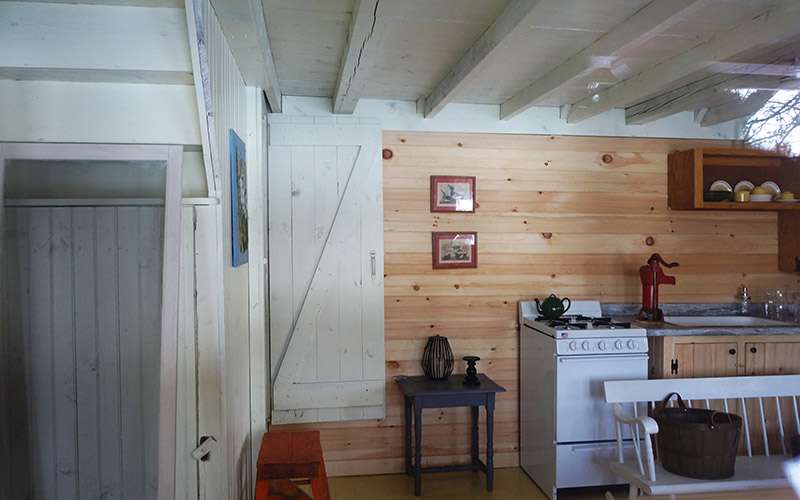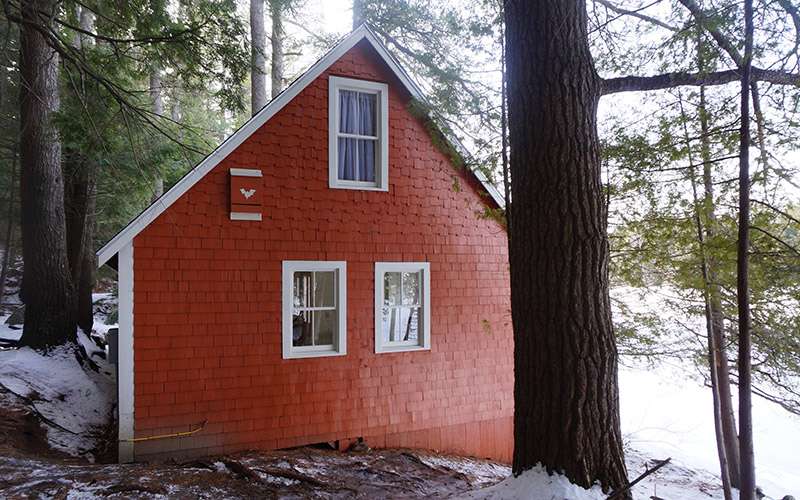
Kennebec Land Trust cabins featured on TV are now available to rent
 Photo / Maureen Milliken
Cabin 2, the Wakefield Wildlife Preserve eco-cabin renovated by the crew of the "Maine Cabin Masters" DIY network show.
Photo / Maureen Milliken
Cabin 2, the Wakefield Wildlife Preserve eco-cabin renovated by the crew of the "Maine Cabin Masters" DIY network show.
The Kennebec Land Trust has become a landlord for the first time in its 30-year history, offering two renovated West Gardiner cabins for rent from July through October this year.
The Winthrop-based trust announced the cabin project last year, but the cabins couldn’t be made available — or even shown publicly — until Monday night’s episode of “Maine Cabin Masters” aired.
The DIY network show chronicled the $80,000 renovation of the two small cabins on Cobbossee Stream, part of the trust’s Wakefield Wildlife Santuary.
The trust contributed $35,000 to each renovation, while the show contributed $10,000 for Cabin 2, the one featured on the show.
The show’s crew, led by Chase Morrill of Wayne-based Kennebec Property Services, renovated both cabins, though the show only featured one.
There are two more cabins on the property, and Kennebec Land Trust Executive Director Theresa Kerchner said that if enough income is generated from rentals, the other two may be renovated in the future.
The goal of the rental program is to raise money for the trust and maintaining the preserve, she said.
“We have some significant expenses, and we hope future rentals will help us meet our budget,” she told Mainebiz Wednesday.
Expenses include taxes. “Since we have camps on the property, we pay the same rate that any landowner would with camp lots,” she said. “The rest of the sanctuary is in open space, so we pay taxes at the open space rate on the undeveloped portion of the property.”
Other costs are maintenance and stewardship of property, things like new trails.
The cabins — Cabin 2 and Cabin 3 of the four-cabin lineup — are small. Cabin 2 is 685 square feet, with a 90-square-foot porch and Cabin 3 is 587 square feet with a 174-square-foot porch.
The rental fee is $135 a night, $945 a week, with a 10% discount for land trust members.
Three is a seven-night minimum stay from June 29 through Oct. 31.
"We're advertising them as eco-cabins," Kerchner said in January. "They're very rustic. It's going to be fabulous."
On the “Maine Cabin Masters” episode she says, “The whole idea is for this to be a property where you can come and be here, but not have any effect on the stream or water quality.”
'Self-serve cabins'

Those who rent should prepare for a rustic experience. Each cabin has a composting toilet in its one bathroom, and two double beds.
The kitchens have hand-pumped water, a gas cooking stove and a gas stove for heat. The lights are solar-powered.
The cabins have a “gray water system,” with a leach field that is powered by a small solar plant in a clearing up the slope.
Those staying are expected to behave in the spirit of their surroundings.
“These are self-serve cabins, offered with an expectation that guests will check in independently, clean up after themselves, and practice leave-no-trace principles,” the land trust website says.
The cabins are accessible by a quarter-mile walk down a camp road from the parking area.
Kerchner said the two of the four cabins on the property, bequeathed to the trust in 2016, were chosen because they were in the best shape and also both right on the water.
The cabin porches overlook the wide stream, with a shared dock and campfire pit.
The cabins are in the heart of the 113-acre preserve, surrounded by pines. It has 4,000 feet of frontage on the stream, which is as much as 60 feet deep in the area and known for its fishing.
They are a quarter-mile walk through the woods down a tote road from the parking area.
While the phrase “in the middle of nowhere,” was used several times by the crew during the “Maine Cabin Masters” episode, the preserve is about a 15-minute drive from downtown Gardiner, and less than half an hour to Augusta.
The trust points out on its website, “While the setting feels remote, it is remarkably central to many of Maine’s most popular attractions.”
'Why would I go anywhere else?'

The previous owner of the land, Kendra Wakefield Shaw, had worked with the trust for a decade to preserve the land that her family had owned and enjoyed for two centuries. She died at the age of 77 in November 2016.
“She wanted to preserve this land, this land’s been in her family for 200 years and it was one of her favorite places to be,” said Amy Lesko, representing Shaw’s estate, said on the show.
Kerchner said the Wakefield Wildlife Preserve maintains Shaw's lifelong passion for nature and wildlife habitat conservancy.
“What was really important to her was to protect the shore frontage here and protect the wildlife,” Kerchner said on the show. Kerchner said Shaw's goal was also to preserve the historic nature of the cabins, which her family began building in the 1890s.
Kerchner said one thing that she found remarkable was that Shaw could travel anywhere in the world, but would say, “Why would I go anywhere else when I could be right here on Cobbossee Stream?”
Besides the low environmental impact and historic aspects, Kerchner also told the shows hosts that they’d like them to use as much Maine-sourced wood as possible. The land trust is a partner in Local Wood Works, which provides resources for and information about using local wood products.
'A Legacy Preserved'

The title of the “Maine Cabin Masters” episode is “A Legacy Preserved,” and focuses on the cabin Shaw frequently stayed in.
Work involved replacing windows, screens on the porch, new windows, new roof, shoring up the foundation and a complete interior renovation.
Much of the furniture that was in the cabins was spruced up and used.
The end result is two sparkling-clean, spare but comfortable cabins that harken back to the history of the property while also complementing the surrounding preserve.
Besides Morrill, the host, the show features his sister, Ashley Eldridge, who has a background in design, her husband, Ryan Eldridge, Jedi Baker, Matthew Dix and Dillon Robinson.
The show also uses local businesses — there were cameos by Francis Folsom, of Folsom Landscape Fabricators, of Augusta, who helps install the dock, as well as Gardiner plumber Doug Peabody, who hooks up the hand pumps at the sinks, which draw water from the stream.
Ashley Eldridge visits the Chewonki Foundation in Wiscasset for a lesson on how to make bat houses from Jessica Woodend.
Eldridge also visits Maine Heritage Weavers in Monmouth to get a lesson in waving from textile expert Bianca Cloutier and to buy local quilts for the cabins.
The Paris Farmers Union, headquartered in Oxford, and with one of its 10 stores in nearby Winthrop, provided the composting toilets.
Solar installation was by Lee Goggin, of Lee Solar in Dover-Foxcroft.
Replacement windows, with sashes made of a wood composite, were made by Broso, and they and the lumber used in the renovations came from N.C. Hunt Lumber in Jefferson.
The show also gives frequent nods to Shaw and her legacy, including some cat details that harken to Shaw's love of cats.
“I think Kendra would be thrilled with what we’ve done,” Morrill says to Ashley Eldridge near the end of the show. “She loved the area wanted to keep it as wild and pristine as she could...I think the Kennebec Land Trust and the people in the community are going to enjoy it as much as she did.”
It’s available on the DIY network several times in the coming weeks. For a schedule visit the show’s website.
It can also be viewed on YouTube.










0 Comments